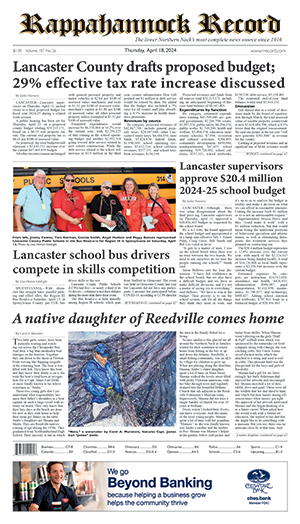KILMARNOCK—Since 1977, Rappahannock General Hospital (RGH) has provided quality health care services to the residents of Virginia’s Northern Neck and Middle Peninsula.
RGH was built for the community, by the community after a small group of young leaders identified the need for emergency care in the area. Prior to the mid-1970s, residents in the Northern Neck area traveled 70-plus miles to Richmond and beyond for emergency or general hospital care, reported marketing and public relations coordinator Joanna Marchetti.
The late R. Frederick Baensch of White Stone was an essential part of the creation of the hospital. He recognized the need for more convenient access to health care services in order for the Northern Neck to continue to thrive. According to his wife Judy, he also admitted a big part of his desire for medical care in the area was “selfishly” to care for his family.
RGH was an outgrowth of the establishment of the White Stone Medical Clinic—now Riverside White Stone Family Practice, said Marchetti. The clinic had a difficult time recruiting and retaining physicians and the most common reason cited was that a local hospital was not available. From November 1972 to April 1974, a group spearheaded by Baensch, who had been instrumental to the establishment of the clinic, sought to obtain a certificate of need to build a hospital in Kilmarnock. At the same time, a similar effort was taking place in Gloucester County. For some time, it appeared only one certificate would be granted between the two proposed projects. Both certificates were eventually approved and the project of financing the Kilmarnock hospital began.
Lancaster County secured the services of a bonding house in New York and a few days before the bonds were to have been put on the market, New York City defaulted in the payment of interest on its bonds and the municipal bond market collapsed. This bonding house however was able to obtain the M.G.I.C. Indemnity Corporation which guaranteed the payment of the bonds and in January 1976, the $4.5 million bond issue was sold. Construction was authorized in February 1976 for building on land donated by the Town of Kilmarnock and the ground-breaking took place on March 6, 1976. Almost exactly a year later, on March 15, 1977, the hospital opened for its first patients, said Marchetti.
The initial board of directors included R. Frederick Baensch, Wilton R. Cundiff, Harold W. Felton, M. D., John I. Fleet Jr., David F. Helsel, D.D.S., Benjamin R. Humphreys Sr., William J. Kopcsak, John R. Lacey, M.D., Melvin B. Lamberth Jr., M.D., William B. McLeod, Jean W. Robertson and Ralph K. Vanlandingham.
Baensch remained an active member of RGH’s leadership team, serving in roles from chief executive officer to chairman of the board of directors, until his passing in July 2015. Judy Baensch has been a member of the hospital’s volunteer auxiliary from the start and remains active in the organization.
Today, Bon Secours Rappahannock General Hospital provides inpatient and outpatient services, including emergency medicine, orthopedics, cardiology, imaging services, surgical procedures, an outpatient infusion center, physical therapy and behavioral health services, continued Marchetti. Additions to the hospital’s services include a sleep lab and on-site neurology appointments. The hospital offers quality, state-of-the-art health care in a convenient, friendly setting, as evidenced by high patient satisfaction scores.
As the area’s largest employer, RGH provides nearly 400 jobs for a range of health care workers who are living and spending in this community, involved with churches, schools and other community groups. By spurring even more economic activity through spending on goods, services and capital improvements, the hospital is a cornerstone of the economy with a multimillion dollar impact in the Northern Neck and Middle Peninsula, she said.
The hospital enjoys a tradition of giving back to the community through participation in health fairs, free screenings and educational forums, as well as support for schools, athletics and charity events, and partnerships with local organizations such as the Northern Neck Middle Peninsula Free Health Clinic and Northern Neck Family YMCA.
The RGH Volunteer Auxiliary has been in existence since the very beginning, providing countless hours of service and donating funds to the hospital from various fundraisers and the Hospital Gift Shop. Another group of volunteers operate Seconds Unlimited Thrift Shop in Kilmarnock, also donating tremendous proceeds to the hospital.
RGH holds The Joint Commission’s Certificate for Primary Stroke Center Certification, which recognizes the facility’s exceptional dedication to educating and training staff to improve outcomes for stroke patients, said Marchetti. Additionally, the hospital utilizes innovative technology to provide telemedicine services for the community including the RP-Vita robot, the first FDA-cleared remote presence robot for hospital patient management. The robot, affectionately nicknamed Rita by hospital staff, allows RGH to offer enhanced neurology care that wouldn’t normally be available in a rural setting.
As part of the Bon Secours Richmond Health System, RGH is closely linked with Bon Secours Richmond area facilities, including Memorial Regional Medical Center, St. Francis Medical Center, St. Mary’s Hospital and Richmond Community Hospital. This network of award-winning hospitals, along with more than 400 providers in the Bon Secours Medical Group, allows patients access to exceptional levels of comprehensive health care.
RGH is staffed by dedicated employees, physicians and volunteers, always ready to provide compassionate care to the community, she said. Leadership includes Bon Secours Richmond East chief executive officer Mark Gordon, RGH chief nursing executive Ann Gumina, RN, BHA and RGH medical director William Stallings, MD.
Cancer center celebrates 27th year
KILMARNOCK—The Rappahannock General Hospital Cancer Treatment and Education Center began in March 1990 after a study conducted through Medical College of Virginia (MCV) identified the greatest incidences of cancer throughout Virginia, and the findings showed higher than average cancer mortality rates in some of Virginia’s most rural areas. The Northern Neck ranked in the top three.
Additionally, research showed that even in the cases where patients in these rural areas were diagnosed and put on a treatment plan, the patients were often not following through with their treatments due to the long distances they would need to travel to regularly attend appointments. This two hour or more travel time placed significant physical, emotional and often financial stress on these patients and their families.
The intent of the outreach program, largely funded through grants, was to make rural doctors and hospital personnel as self-sufficient as possible in treating these cancer patients, reported marketing and public relations coordinator Joanna Marchetti.
Christopher E. Desch, MD, MCV’s director of the program, as well as Tom Smith, MD, were instrumental in their efforts to make this program successful for RGH. They began seeing patients at RGH bi-weekly and six months into the program, had 50 participating oncology and hematology patients.
The first RGH Cancer Center employee was Connie Deagle, RN, OCN, who retired in 2016. She had been employed with RGH since 1982 in the medical/surgical department and was ready for a change, said Marchetti. Six months prior to the program’s introduction, Deagle’s father passed away from lung cancer, finalizing her decision to join RGH’s Cancer Center.
By the program’s 10th anniversary in 2000, MCV was sending oncologists to RGH weekly and approximately 30 patients were seen during each visit. Also, by this time MCV was providing patients requiring radiation therapy access to a van for free transportation to MCV.
In the fall of 1996, RGH built and opened a new wing to house the center, said Marchetti. The program had previously been borrowing rooms from the medical/surgical unit, and the need for space had grown beyond this capacity.
Sadly, a major part of the center’s history occurred in late 2006 with the tragic death of Christopher E. Desch, M.D. He was killed in a single-engine plane crash, while flying near Charlottesville. His 16 years of loyalty and support to the Northern Neck had a great impact on the community and he is revered and remembered fondly by many members of the Northern Neck community, especially the RGH Cancer Center staff.
In 2008, Bon Secours Health System began providing additional support for the center by sending oncologist Susan Schaffer, MD, to see patients every other week. By the 20th anniversary in 2010, the clinic was seeing approximately 180 patients per month.
In addition to life saving treatments including chemotherapy, the center has provided significant education and support to patients and the community, she continued. From providing important training and education to local physicians and medical staff to raising awareness about issues such as prevention and screenings, the center quickly became the go to place for all things cancer related in the Northern Neck. The staff has participated in many community events to raise awareness and funds over the years, including their long time participation with the local Relay for Life events and the “Look Good, Feel Better” sessions, an American Cancer Society’s program for female patients in active treatment, as well as those patients experiencing the appearance-related side effects. The program is still in effect today, through the help of Jennifer Bishop of Merle Norman in Kilmarnock.
Statistics don’t show the level of dedication and commitment the staff has for their patients; however, in the center office, there are multiple scrapbooks filled with photos, postcards, letters and celebration of life materials from former patients, that speak to the patients’ love for the staff, and more significantly, the staff’s personal devotion to each and every patient who has ever walked through their doors, she said.
Today, the facility is known as the Bon Secours Rappahannock General Hospital Outpatient Infusion Center (OPIC), and still provides cancer patients and their families the highest quality and most comprehensive treatment available—all in a comfortable setting, close to home.
Bon Secours Virginia Health System hematologist-oncologist Michael Steinberg, MD, joined the team in October 2014 and sees patients in Kilmarnock five days a week. Dr. Steinberg is certified by the American Board of Internal Medicine, Hematology and Medical Oncology and brings more than 40 years of experience.











